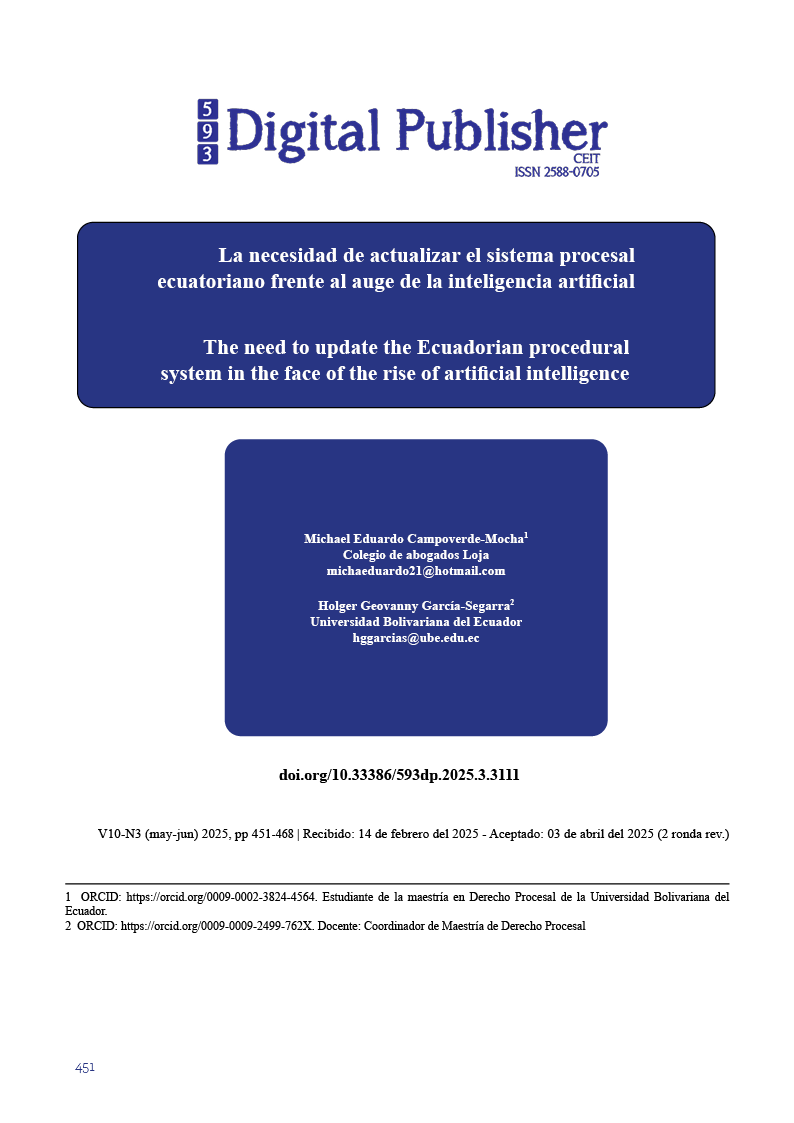The need to update the Ecuadorian procedural system in the face of the rise of artificial intelligence
Main Article Content
Abstract
Our Ecuadorian Procedural Legal system has always evolved according to the advancement of society and its interactions. In recent times, the rise and use of Artificial Intelligence as a tool to streamline, manage and improve the transmission of information has been observed worldwide. as well as the interaction between people, which poses the challenge that it can also be incorporated into our Procedural Judicial System, which is why this article addresses this topic from a qualitative approach, using the deductive method, since it analyzes the different information contained within the different societies, and even using comparative law about the countries that have directly implemented said technological tool in their jurisdictions, trying to find its application within our Ecuadorian judicial procedural system which needs to incorporate the respect in its regulations laws that guarantee its use in an ethical and regulated manner, a situation that with the development of the various applications has been compromised, finding us faced with gaps in the law, which, as always, make it necessary for them to be constantly updated and vanguard of society's needs.
Downloads
Article Details

This work is licensed under a Creative Commons Attribution-NonCommercial-ShareAlike 4.0 International License.
1. Derechos de autor
Las obras que se publican en 593 Digital Publisher CEIT están sujetas a los siguientes términos:
1.1. 593 Digital Publisher CEIT, conserva los derechos patrimoniales (copyright) de las obras publicadas, favorece y permite la reutilización de las mismas bajo la licencia Licencia Creative Commons 4.0 de Reconocimiento-NoComercial-CompartirIgual 4.0, por lo cual se pueden copiar, usar, difundir, transmitir y exponer públicamente, siempre que:
1.1.a. Se cite la autoría y fuente original de su publicación (revista, editorial, URL).
1.1.b. No se usen para fines comerciales u onerosos.
1.1.c. Se mencione la existencia y especificaciones de esta licencia de uso.
References
Adapa, V. R. (2024). Navegando por la paradoja de la privacidad: cómo equilibrar el avance de la IA y Proteccion de Datos . International Journal of Scientific Research in Computer Science, Engineering and Information Technology , 99-110.
Aguilera, E. (2007). Inteligencia artificial aplicada al Derecho . México : UNAM.
Alves, M. A. (2022). Da “caixa-preta” à “caixa de vidro”: o uso da explainable artificial intelligence (XAI) para reduzir a opacidade e enfrentar o enviesamento em modelos algorítmicos. Direito Público, 1-6.
Castro, L. (2006). Fundamentals of Natural Computing. New York : Chapman and Hall.
Codigo Civil Ecuatoriano. (14 de 02 de 2022). Registro Oficial. Quito, Ecuador : Edición Constitucional del Registro Oficial 15, 14-III-2022.
Código General de Procesos . (7 de Febrero de 2023). Registro Oficial . Quito , Ecuador : Registro Oficial Suplemento 506 de 22 de may 2015.
Código Integral Penal . (3 de Febrero de 2014). Quito, Ecuador : Registro Oficial SAN-2014-0138 .
Degli-Sposti, S. (2023). La ética de la Inteligencia Artificial. Madrid: CSIC Consejo Superior de Investigaciones Científicas.
Elena, S. (2018). Justicia Abierta: aportes para una agenda en construcción. Buenos Aires: Ediciones SAIJ.
Garrido, A. (2020). Los Avances de la Inteligencia Artificial. Madrid: Dykinson.
Herrera de las Heras, R. (2022). Aspectos legales de la inteligencia artificial: personalidad jurídica de los robots, protección de datos y responsabilidad civil. Madrid: Dykinson.
Ibañez López-Pozas, F. (2024). Inteligencia artificial: los derechos humanos en el centro. Madrid: Dykinson.
Ibarra Armas, J. A. (2024). Adaptación del marco legal laboral ecuatoriano al impacto de la inteligencia artificial. LATAM Revista Latinoamericana de Ciencias Sociales y Humanidades, 1850-1864.
Kovacheva, D. (2024). How Long Shall Man be the Measure of all things ? Economic Alternatives, 439-468.
Laín Moyano, G. .. (2021). Responsabilidad en inteligencia artificial: Señoría, mi cliente robot se declara inocente. AIS: Ars Iuris Salmanticensis, 197-232.
Larrea, N. P. (2022). Análisis de los lenguajes de programación más utilizados en el desarrollo de aplicaciones web y móviles. Dominio de las Ciencias, 1601-1625.
Lasse, R. (2018). Inteligencia artificial 101 cosas que debes saber hoy sobre nuestro futuro. Barcelona : Planeta, S.A.
Leavitt, D. (2006 ). El hombre que sabía demasiado . Barcelona: Antoni Bosch Editor .
Ley Orgánica Para la Transformación Digital y Audiovisual. (7 de Febrero de 2023). Registro Oficial . Ecuador: Registro Oficial Tercer Suplemento Nro. 245 .
Martinez, M. (2013). La educación en América Latina: entre la calidad y la equidad. Barcelona: Octaedro.
Meseguer González, P. y. (2017). Inteligencia Artificial. Madrid: CSIC Consejo Superior de Investigaciones Científicas.
Miftakul Huda1, A. A. (2024). Legal Challenges in Regulating Artificial Intelligence: A Comparative Study of Privacy and Data Protection Laws. International Journal of Social and Human, 116-125.
Montece Giler, S. (2023). Impacto de la inteligencia artificial en la privacidad y la discriminación: perspectivas jurídicas en Ecuador. Salud, Ciencia y Tecnología – Serie de Conferencias, 1-10.
Morillo Velasco, J. (2020). La justicia electrónica en Ecuador: desafíos para un cambio de paradigma. Diálogos Judiciales VII, 57-70.
NORTHPOINTE. Practitioner’s Guide to COMPAS Core. (2009). Measurement & treatment implications of compas core scale. Northpointe Institute for Public Management, Inc, 1.
Porcelli, A. (03 de 2020). Un nuevo statu quo económico, industrial y social La Quinta Revolución Industrial y Sociedad 5.0. Diario DPI Suplemento Derecho y Tecnologías, 56, 1-6.
Rebollo Delgado, L. (2008). Introducción a la protección de datos: (2 ed.). Madrid: Dykinson.
Rivero Ortega, R. (2023). Derecho e Inteligencia Artificial. Santiago de Chile: Olejnik.
Sánchez, C. (2019). academia.edu.ec. Obtenido de Sánchez, C., & Vera, A. NADA ES PRIVADO: UN DOCUMENTAL SOBRE CAMBRIDGE ANALYTICA.: https://d1wqtxts1xzle7.cloudfront.net/65604483/Nada_es_privado_Un_documental_sobre_Cambridge_Analytica-libre.pdf?1612450913=&response-content-disposition=inline%3B+filename%3DNada_es_privado_un_documental_sobre_Camb.pdf&Expires=1724787628&Signature=YEPglo
Segura, R. E. (2023). Inteligencia artificial y administración de justicia: desafíos derivados del contexto latinoamericano. Revista de Bioética y Derecho, 45-72.
Senado de la República de México . (2022). Inteligencia Artificial y su aplicación en Los Sistemas de Justicia en América Latina . Instituto Belisario Dominguez , 1-20.
Velez Herrera, J. (2007). Evolución en la Tecnología: de la inteligencia artificial al meme . Mexico : Palabra de Clío.



